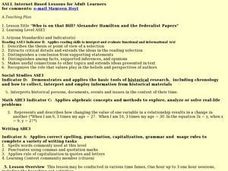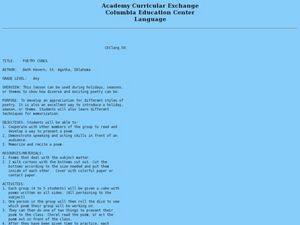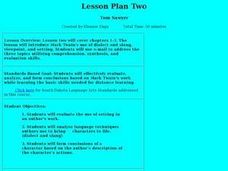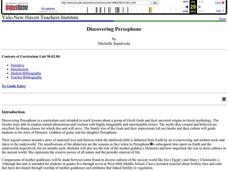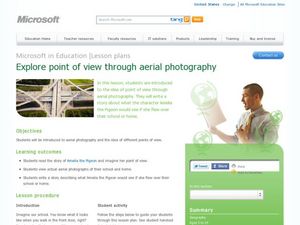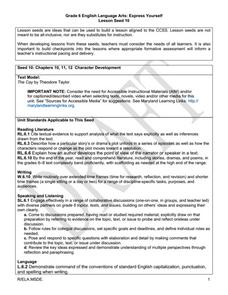Curated OER
Families and Communities
Here is a week-long activity on the roles of family members designed for first graders. In it, learners share stories of their families, listen to books about families read to them by their teacher, complete homework assignments and...
American Psychological Association
Activities from the Society for the History of Psychology Website
The Society for the History of Psychology provides a list of teaching activities designed to acquaint learners with the various fields of psychology and introduce them to prominent psychologists. Details for several of the activities are...
Digital Forsyth
Old Salem Speech
The focus of the lesson is rhythmic speech and 4/4 time. The topic of the lesson is trades common in Old Salem during the colonial period. Learners will practice keeping time with their voices and body percussion. They will then research...
Curated OER
Who is on that Bill? Alexander Hamilton and the Federalist Papers
Students, who are adult learners, participate in an Internet scavenger hunt in order to assimilate information about the biography of Alexander Hamilton and the Federalist Papers. They look at the Federalist and Anti-Federalist Papers...
Curated OER
Poetry Cubes
Reading aloud can be scary, but it's an important way to build oral fluency. Break the class into groups of four or five learners. Each learner will roll a cube to determine which poem they read aloud to their small group. Feel free to...
Curated OER
Literary Analysis of Theme
Remember reading "The Lottery" and "The Possibility of Evil" by Shirley Jackson? Learners can experience and analyze the tension, themes, and human experience found in these pieces through reading and class discussion. They use...
BBC
Local Democracy
Expanding our students' understanding of government at a local level is a great way to build an understanding of government at a global level. Start the understanding by using any of these fun teaching ideas. Learners engage in several...
Curated OER
Social Pyramid of Ancient Egypt
Sixth graders describe the defining characteristics of major world civilizations from political, social, and economic perspectives. They compare and contrast the religions in terms of leaders, beliefs and locations.
Curated OER
Tom Sawyer
This instructional activity kicks off with a PowerPoint presentation on Mark Twain. Learners examine the dialect, slang, viewpoint and setting. Then use e-mail to address three topics utilizing comprehension, synthesis, and evaluation...
Curated OER
Teach Peace Now
Help your learners discover empathy and understanding by investigating two sides of a situation. In this humanities lesson, pupils examine different pairs of shoes and hypothesize about who may have worn them. Discuss real life...
Curated OER
Home Living/Life Skills: Face Washing
Having good hygiene skills is a very important part of living an independent life. Learners with special needs follow sequencing cards to practice washing their faces. They follow each step in the process and discuss the importance of...
San Bernardino Co. Supt. of Schools
Was Julius Caesar a Good Leader for Rome?
Learners consider the various perspectives that different groups in Roman society may have had for Julius Caesar, such as Roman soldiers, senators, the working class, and slaves. The primary activity involves a reading of Caesar's...
Curated OER
Tropical Forest Food Chain
Learners explore the interdependence of the animals and plants in tropical rainforests. They explore the importance of conserving biodiversity and tropical food chains. They create a tropical forest food chain and identify species that...
Yale University
Discovering Persephone
Here is a resource that introduces learners to how the stories from Greek mythology explain the workings of natural phenomena, movements of the seasons, and how the conflicts of the gods mimic our own daily difficulties. Learners...
Curated OER
Prop Box
What other uses can you brainstorm for a key? What about a pair of sunglasses? Bring a bag of props into your classroom and have learners create different uses for a selection of objects. Then, after everyone has shared, translate the...
Curated OER
Explore Point of View Through Aerial Photography
Read the story Amelia the Pigeon and discuss perspective. Since Amelia is a pigeon with a bird's eye view, use aerial photography to enhance your learners' understanding. Have fun connecting art and literature while talking about...
Curated OER
Asking Research Questions
Using discoveries and inventions as the focus, learners complete a research project. First, they come up with research questions. Then, they conduct research on the topic. Finally, they write a research paper.
Curated OER
Lesson Plan 3: Great Book, Gross Book
It's time for your scholars to become book reviewers! Start with a fun review of foods: are they good or gross? Learners apply these evaluation techniques to books, recording their thoughts on large pieces of butcher paper. Simply have...
Curated OER
Express Yourself Lesson Seed 10: Character Development
Make a study of Timothy and his development as a character over the course of the first half or so of The Cay. This idea focuses in particular on chapters 10 through 12. Learners start out by working on double-entry journals created in...
Curated OER
Harvesting the Crop
What is philanthropy? To find out learners explore the concept through class discussion. They survey, make decisions, implement, and reflect on a service project intended to benefit their community.
Curated OER
Little Bees, Big Potential
After reading an article on the alfalfa leafcutting bee, learners chart its characteristics alongside those of the honeybee. Then they draw the leafcutter lifecycle. The article provides fascinating reading when studying the role of...
Curated OER
First You Take an Ecumene
Although this was written regarding Canadian agriculture, it can be used in any agriculture or environmental science class. Learners evaluate agricultural and economic activity maps and consider land use competition. Activities that get...
Curated OER
Prairie Scavenger Hunt
Here is a simple lesson for young learners on the plants, animals, and flowers found in the prairie environment. There are worksheets embedded in the plan that pupils use once a teacher-led discussion and demonstration has taken place....
Curated OER
What A Tangled Web We Weave
Learners of many ages discuss how all organisms rely on other organisms for their survival. They construct a food web and energy pyramids, and write an informative essay about the food web that they have designed.
Other popular searches
- Lessons for Diverse Learners
- Diverse Learners Science
- Health for Diverse Learners
- Students as Diverse Learners
- Diverse Learners Lesson
- Diverse Learners Pe
- Pe for Diverse Learners
- Diverse Learners Health



